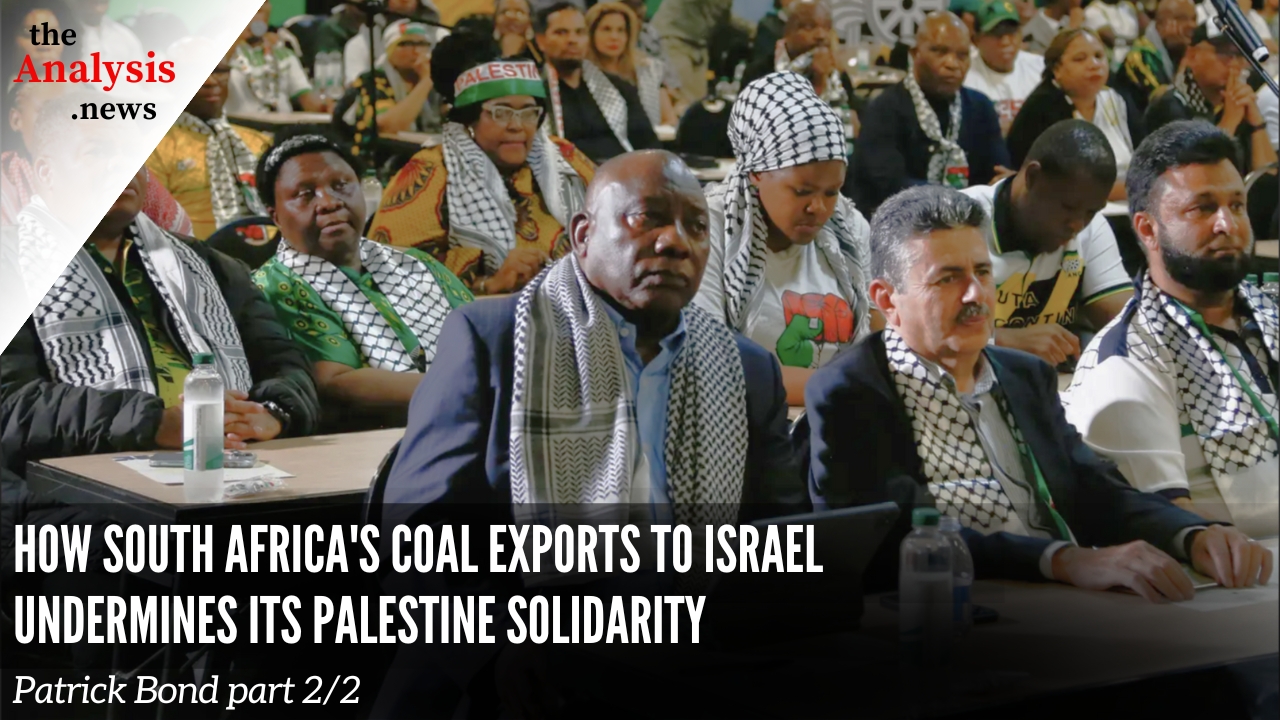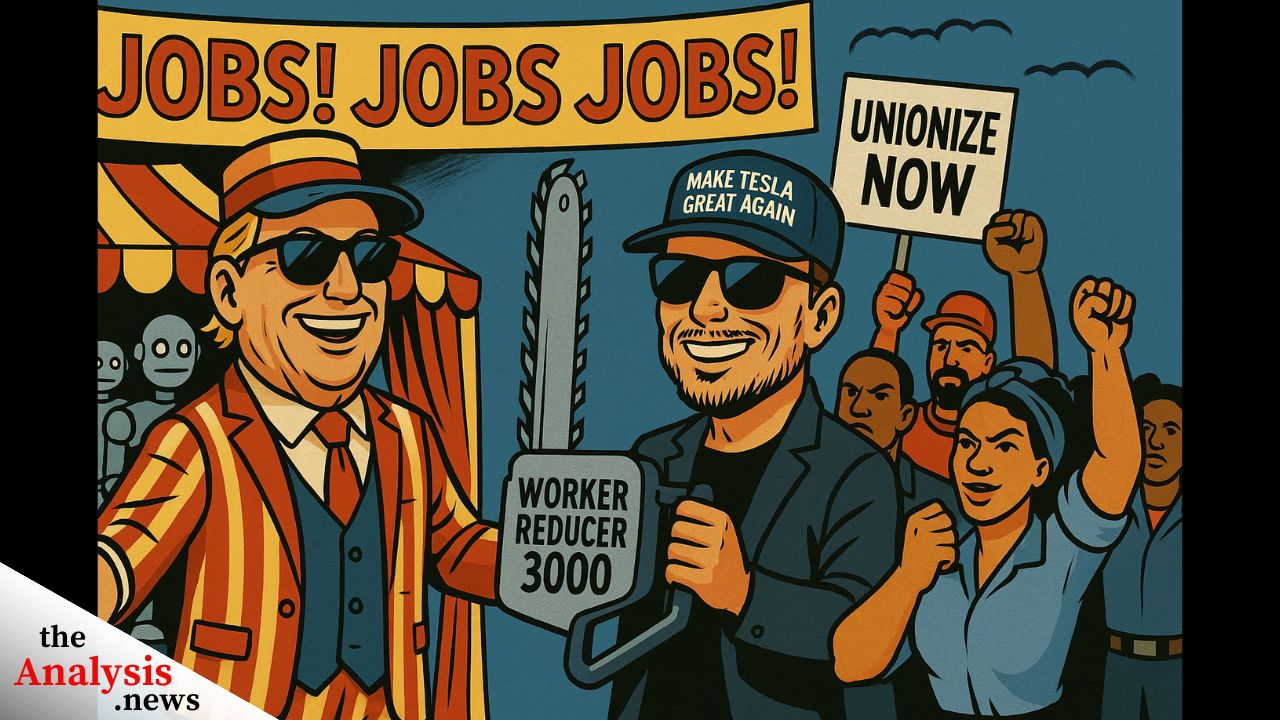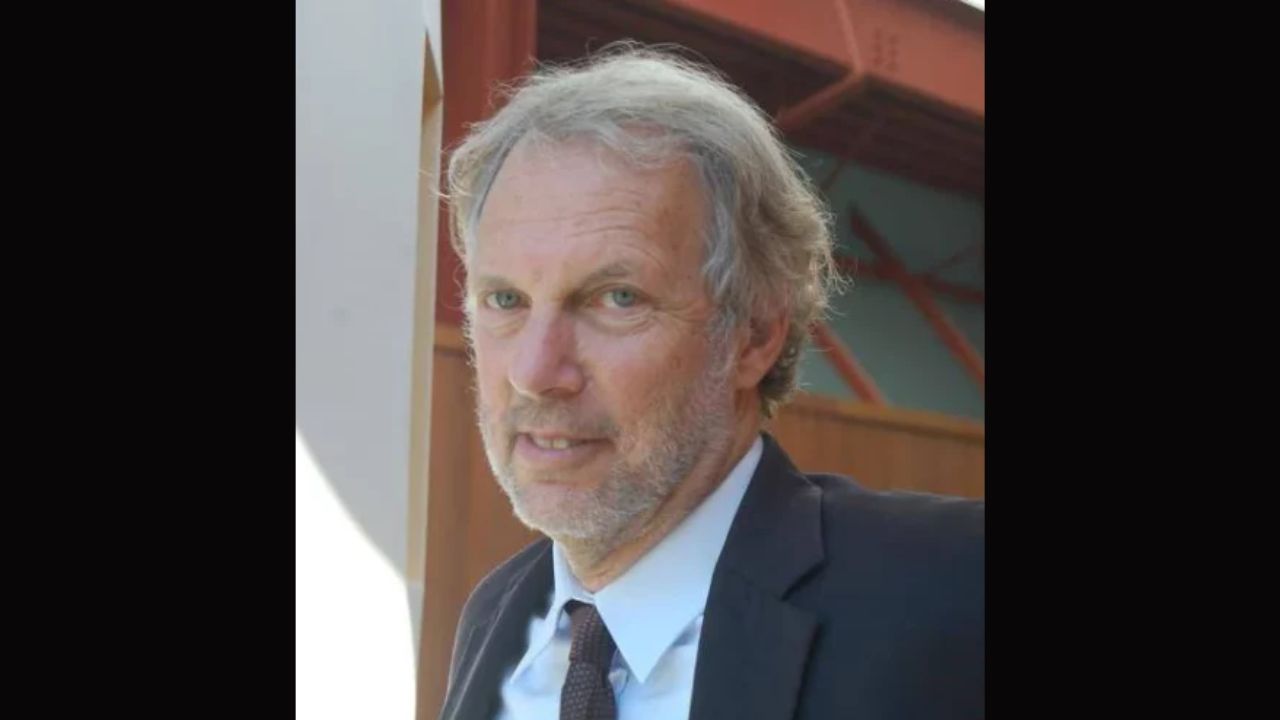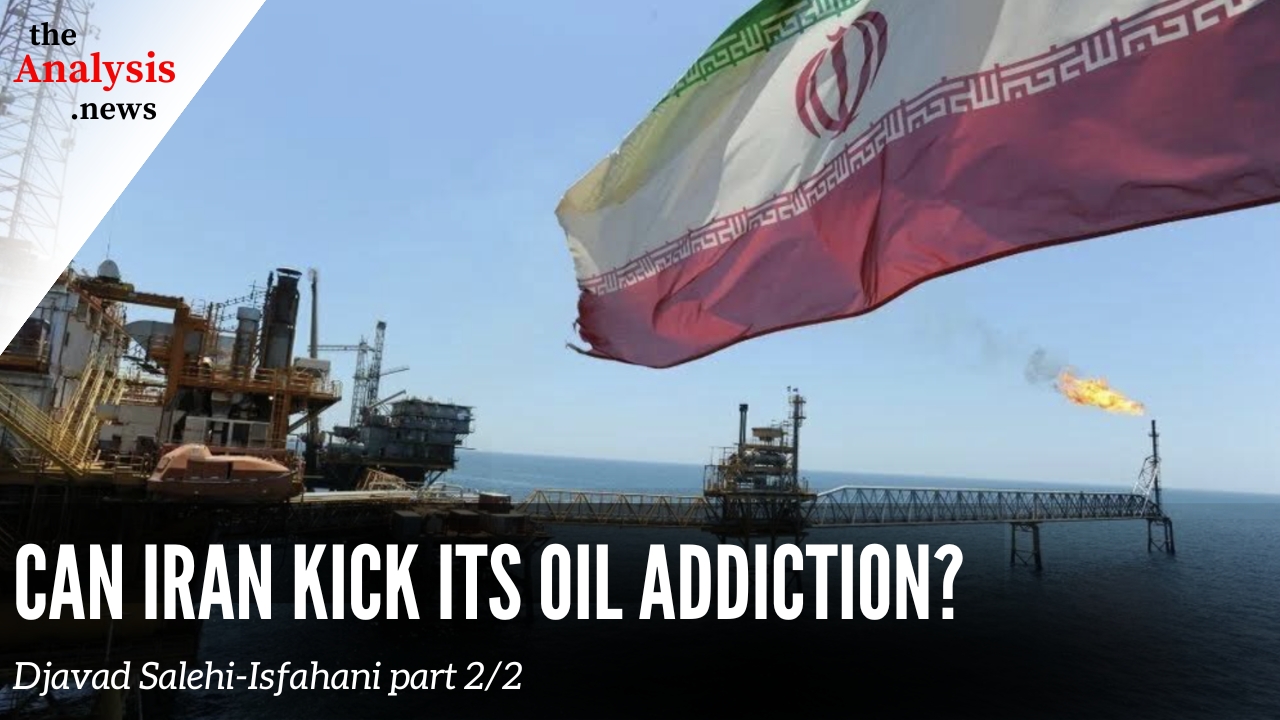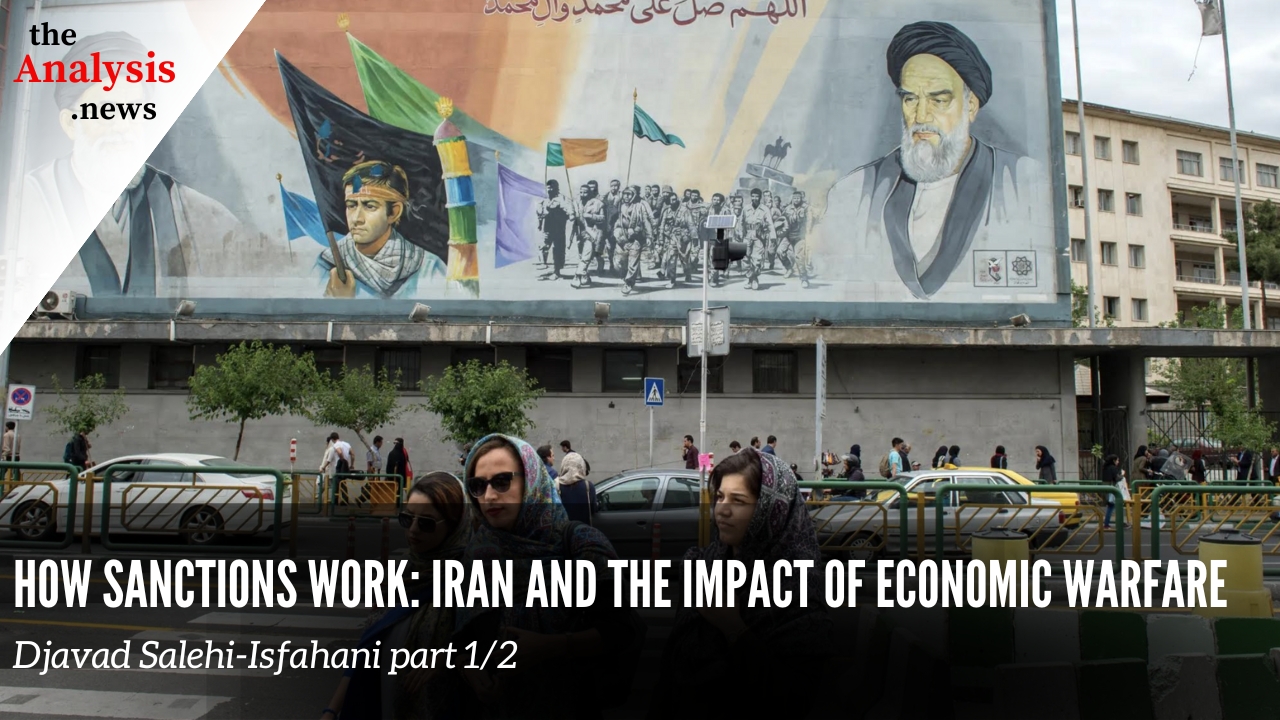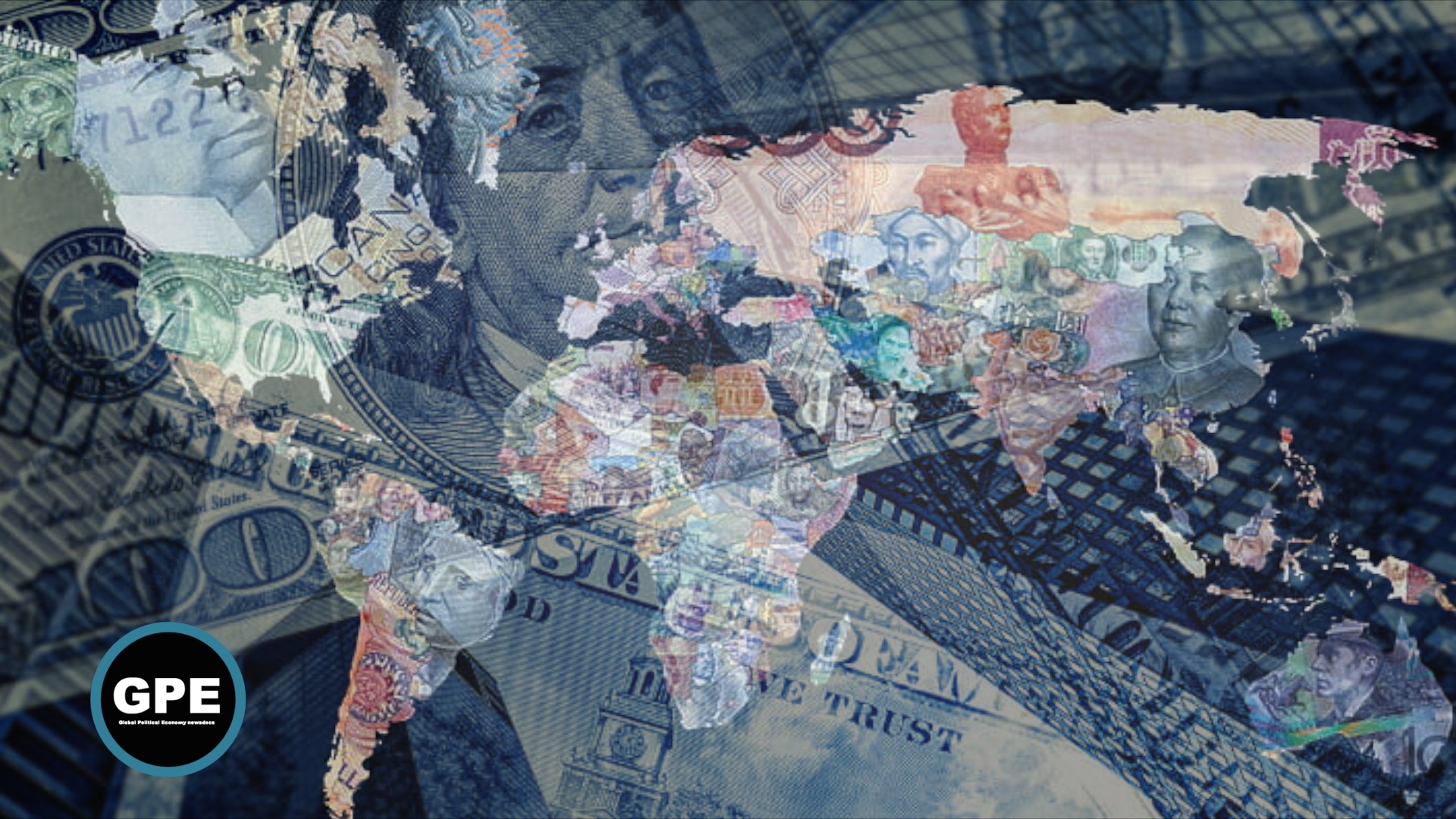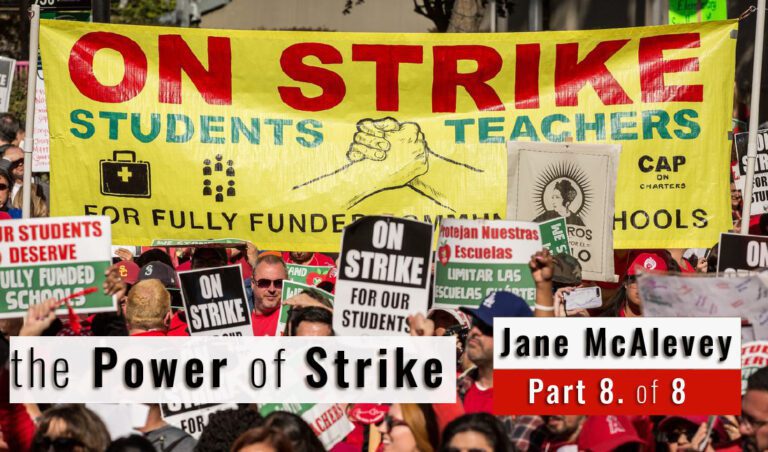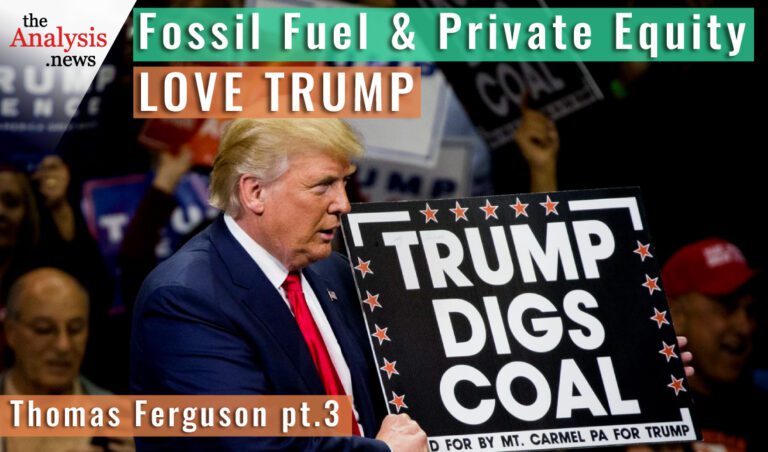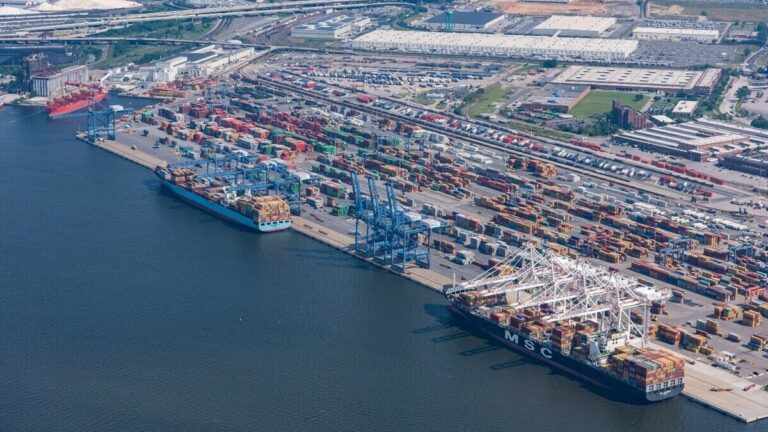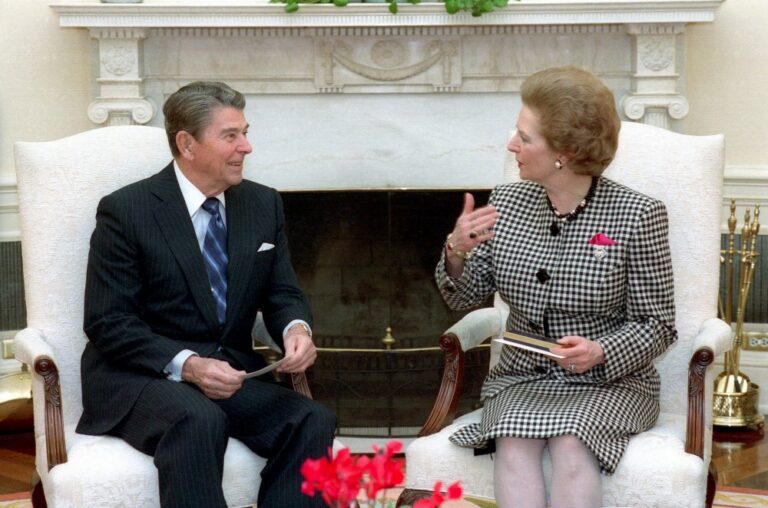In part two, political economist Patrick Bond outlines the activities of Glencore and other South African energy corporations which continue to ship coal to Israel’s electricity grid. Despite the historic efforts of South Africa to bring a genocide case against Israel at the International Court of Justice, as well as its involvement in the Hague Group to demand enforcement of international rulings on Israel’s unlawful occupation, Bond discusses South African policies and crony capitalist transactions which ultimately undermine these Palestine solidarity initiatives. With corporations such as India’s Adani Group heavily invested in Israel’s economy, Bond exposes the contradictions in BRICS’ stance towards Israel.
How Capitalism Pillages the Planet and Creates Chaos – Patrick Bond Pt. 1/2
Talia Baroncelli
Hi, I’m Talia Baroncelli, and you’re watching theAnalysis.news. This is part two of my conversation with political economist Patrick Bond. We’ll be discussing the over-accumulation of capital as well as BRICS sub-imperialists and what some other countries have been doing to ensure that international law is upheld and that Israel is held to account when it comes to their genocide of the Palestinians.
If you’d like to support us, you can go to our website, theAnalysis.news. Feel free to hit the donate button at the top right corner of the screen. Make sure you’re on our mailing list; that way, you get all of our content sent straight to your inbox. You can like and subscribe to our YouTube channel, hit the bell to get all of our notifications, or listen to us on Apple or podcast streaming services. All right, let’s get right back into it with Patrick Bond.
I’m very excited to be joined by Patrick Bond. He is a political economist as well as a Professor of sociology at the University of Johannesburg, where he directs the Center for Social Change. He’s also the author of a book called BRICS: An Anti-Capitalist Critique, which he co-authored with Ana García. It’s great to have you back, Patrick. Thank you so much.
Patrick Bond
Well, thanks, Talia. Great to be on theAnalysis again.
Talia Baroncelli
Why don’t we speak about BRICS and BRICS’ purported opposition to the Israeli genocide and to Trump? If you look at the political elite within South Africa, I think there’s a faction that would say, “Let’s tone down the Palestine solidarity rhetoric and try and make amends with Trump.” How would you characterize what Cyril Ramaphosa has been doing? There still is a lot of coal that’s actually being sent from South Africa to Israel. You wrote about this recently. You said that Israel’s 17. 5% coal-fired power grid also relies on South Africa, and on February 11, a massive bulk cargo boat called the Cape Friendship arrived at Israel’s Hadera Port directly from Richard’s Bay in South Africa, carrying 170,000 tons of coal. Where does South Africa actually stand on the issue of Palestine solidarity?
Patrick Bond
Talia on the numbers, that’s right. That makes us the number two coal supplier at the moment. Number one, ironically, Colombia, which in June last year said, “No, we’re not going to.” Gustavo Petro, a great President there, said, “This is fueling genocide. While there’s a genocide, we won’t allow this coal to come from two companies, that is Glencore, Swiss-based, with the Johannesburg Stock Exchange Listing and the London Stock Exchange Listing, and Drummond from the US State of Alabama.
Now, those two companies, just in the last month, have put three ships from Colombia over to Hadera. What happens then is the coal is unloaded, it’s burned in the Orot Rabin power plant, and as you say, 17. 5% of Israel’s grid comes from that coal-fired power. There’s a lot of climate implications of sending that much coal. South Africa has been doing it really since the 1990s. We found one company, especially Glencore, with contracts through its predecessor, which is called Xstrata. They have teamed up with President Cyril Ramaphosa’s brother-in-law. His name is Patrice Motsepe, his company African Rainbow Minerals.
If you put that together and you remember that Glencore also had as its partner, not just Motsepe himself, but his brother-in-law Ramaphosa, actually as the chair of one of the major coal mine and his Shanduka Coal Company in League with Glencore. It’s a very rotten little group at the top, including the President. That schizophrenia we’re facing, where our BDS movement of protesting at Glencore, calling out Patrice Motsepe, are doing what we can to end the call with groups in Colombia and groups, of course, in Ramallah and in Germany, where you may know, Shir Hever is one of the managers of this stopping energy to Israel. The dilemma is there, just making so much profit.
The other dilemma is if we actually want to stop coal, we do about 80 million tons a year full capacity, but it’s recently been closer to 50 because the rail lines are down because of criminals stealing the cables and a lack of maintenance. But when you see this big, big effort by roughly Glencore, one and a half million, sometimes they do up to five million tons of imports into the Israeli grid of coal, then it does become a high priority. Of course, there’s also oil and new members of the BRICS, like Nigeria, are very much in the oil. United Arab Emirates and Saudi Arabia, which nearly became a BRICS member, also providing gas. Brazil supplies 9% of Israel’s oil, one of the founding BRICS. Then Russia allows the Kazakhstan oil to go through the Baltic Sea ports of Russia.
We’re looking at many layers, and then we add to that, Talia, since you ask about the BRICS in Israel, you add the port of Haifa, the major port, is privatized by two companies. One is a Shanghai, SIPG, and the other is India Adani Group. Then you look at the military relations. Yahya Sinwar was killed by a drone from China. There are lots of these IDF drones that are made in China. India has provided plenty of ammunition to the IDF and has strong military ties that go way back. South Africa has one military figure, an arms dealer, who’s very tight with the IDF and has a Tel Aviv office named Ivor Ivor Ichikowitz. Brazil has hosted Elbit. They have an office there. The South African, Ichikowitz and Elbit do deals together with the fascist army of Ecuador for major militarized vehicles. I could go on and on, but the point being that if you add these BRICS, now there are 10, not just Brazil, Russia, India, China, South Africa, but UAE and Egypt. Now we’ve got Indonesia Ethiopia, and Iran. Certainly, Iran is the main enemy of Israel in the region there, obviously, after the rest of the axis of resistance that’s really rising up still.
I think that makes BRICS quite schizo. So four of the hostages from the Hamas tunnels are Russian. Putin himself estimated two million Russian citizens who are Israeli Jews out of the 7. 2 million because of the huge immigration that occurred after the collapse of the Soviet Union.
What this means, Talia, even though South Africa can talk left at the International Court of Justice and International criminal court, we find walking right or profiting from the genocide all over the show. It’s not just coal, it’s diamonds and it’s grapes. To actually operate in a milieu like this where we’re seeing again and again, such as the Stilfontein Mine Massacre last month, where the presidency just said, “Well, we want to smoke out the miners.” At least 87, probably 150, died in the process, maybe more. We’re therefore looking at the G20 advertising itself, even Ramaphosa at the last G20 meeting saying, “Don’t use hunger as a weapon of war,” but that’s exactly what they did to kill by starvation, including people resorting to cannibalism, 2.5 kilometers deep in that mine. These, let’s say, reflections of a very, very brutal capitalist society here. But the top layer of rhetoric of solidarity and equality and sustainability that we all love to hear and anti-genocide actions at the ICJ create a certain, I don’t know what we would say, but it leaves us all spinning.
Talia Baroncelli
I think there are two things to look at here. We obviously can’t discount what South Africa has done for Palestinians by bringing this case to the ICJ and essentially drawing attention to Israeli war crimes, the Israeli genocide, and laying out the evidence showing that there’s a plausible case of genocide here on the part of the Israeli military in the Gaza Strip. Then, of course, as you mentioned, there’s the Hague Group, which is a group of countries comprised of Belize, Bolivia, Chile, Cuba, Colombia, Honduras, Malaysia, Namibia, Senegal, and, as you mentioned, South Africa. There are efforts underway to make sure that the so-called rules-based order is actually enforced in a way that is equitable, in a way that recognizes the equality of states. That was something that was enshrined in the post-World War II era, where every country has one vote.
Unfortunately, that’s actually not how things play out when you look at power dynamics. I think that was really on display at the Munich Security Conference recently, where Russian imperialism was completely condemned, as it should be, but then the efforts of the United States or Europe to enable imperialism or colonialism in Israel or in other places without even recognizing the role that the West has played in perpetuating the war in Ukraine, none of that was dealt with at all. I wonder how you see this so-called rules-based order and perceptions of it continuing, or if there’s going to be just a might is right order that plays out over the next few years with the Trump administration.
Patrick Bond
Yes, well, let’s just step back because the terrain on which we’re discussing this is the waning power of the US Empire, but within imperialism, which is much bigger than just the Pentagon. The Tricontinental Institute considered hyper-imperialism to emanate from merely the military capacities. But if you look at a broader sense of imperialism, then you find two logics. One is the logic of capital accumulation, and the other is the logic of territorial expansion. I think that’s what you’re driving at, which is that, yes, NATO can be held responsible to some degree for provoking Russia by expanding eastwards in spite of promises made in the early ’90s by the likes of Kohl, Reagan, Thatcher, and George H. W. Bush to the likes of Yeltsin and Gorbachev before him, not to do more than just take East Germany back into West Germany, to United Germany. Those regular violations, including in recent years by Barack Obama, but throughout the Bush administration. Those then would provoke an increasingly aggravated Vladimir Putin, who by an earlier Munich Conference, I think it was in 2011, really made clear that this is the red line, and you guys shouldn’t try to bring more countries like Ukraine into NATO.
That, let’s say, excuse is plausible, but inexcusable. In other words, to invade and to kill maybe half a million Ukrainians, working class kids, and blow up huge chunks of the country. Certainly the logic of accumulation where the likes of BlackRock and major mining houses and corporate agriculture are looking at Ukraine, privatizing what is left of Ukraine. The Russians want the critical minerals, about 60% of which are in the land that they’ve just invaded. Now, that does become part of capitalist accumulation logic.
All in all, what it does look like to me is that normally you have a sub-imperial layer within imperialism. This goes back to not just Lenin, who talked about the small imperial states, but a man called Ruy Mauro Marini, a Brazilian who saw in 1964 with the US-backed coup against the Goulart democracy and the generals coming to power. Marini, a dependency theorist, goes into exile in Mexico and begins this discussion about this other layer who play a key role. Nations or country states that play a key role in the expansion of imperialism. Although there are contradictions or there are moments where these forces come into contact and when they get really serious, sub-imperial countries like Russia can go rogue. They don’t play by any rules. They just come and invade and deny the sovereignty of Ukraine. Likewise, you have a rogue imperialism. I would say Janet Yellen, the US Treasury Secretary, went rogue when she pushed her Western colleagues to steal some 350 billion, or some, say more, of not just Russian Central Bank, but the oligarchs assets that they’d carelessly left in the West in February and March. Then they started to break down the financial system. As Putin always complains, they weaponize the dollar. In that sense, we’ve even seen the BRICS New Development Bank go right along with this because they’re not answering really to their 20% shareholder in Moscow because they cut Moscow off on March 4, 2022. Who are they answering to? Well, it’s pretty obvious. I’ve talked to some top executives there. They were answering to the three main credit rating agencies, Standard & Poor’s, Fitch, and Moody’s in New York.
You see, when you put these together, what becomes absolutely explicit is a global value chain approach. My phone here, a Western-branded phone, has got some child labor from the Eastern Democratic Republic of the Congo. In that coal plant from the DRC, I can see some profits going to Rwanda because the coal plant didn’t go out through the DRC, as the DRC has even been suing Apple. It goes out through Rwanda, an M23 takeover of the east side of the DRC in the last weeks. We’ll confirm that. Where does the coal plant go? It goes into Foxconn or similar plants in East Coast of China or the Chengdu or wherever it’s going, and then ends up with the massive profit in these Western-branded companies that have intellectual property and marketing and royalties and financing, and all the systems they have to draw up most of the profits. It’s that imperialism and the sub-imperialism of the Chinese mine and the Chinese factory, even if it’s a Taiwanese factory, Foxconn. They get protection from the South African National Defense Force. We’ve had about 3,000 of our army troops, 14 died in the last couple of weeks. A great tragedy. But our SANDF is out there as a sub-imperial army, as they’ve been in Northern Mozambique on behalf of Total Energies and in various other places.
I mean, this is in a sense why, Talia, I think a bigger picture in which the World System School of sociology, core semi-periphery, periphery, can be adapted to ensure that we understand sub-imperial relationships. Those are being torn to cinder in all sorts of ways, certainly by Putin, by Janet Yellen, and of course, now by Donald Trump, walking out of some of the most crucial parts of the imperialist, the same machinery like the United Nations Framework Convention on Climate Change, a very effective tool, the UNFCCC for advancing the interests of both the West and the BRICS. I think it’s that combination that we look for. It’s not BRICS against the West or being anti-imperialist. It’s within the West being sub-imperialist.
Talia Baroncelli
I wanted to ask you about a theoretical concept which you’ve used a lot, and that’s the over-accumulation of capital. Polish-German revolutionary Rosa Luxemburg was one of the first to speak about the over-accumulation of capital in her work on imperialism. She wrote that the over-accumulation of capital periodically bursts out in crises and spurts capital onto a continual extension of the market.
You have used this concept in another article of yours called Capitalist Crisis: An Uneven Development Applied in Southern Africa. I quote a part of your article where you write, “As a general rule, capitalism responds to over-accumulation crisis tendencies in what is ultimately a self-destructive way, attempting to restore profitability through what Marx described as relative and absolute forms of surplus value extraction. The former is the even more rapid replacement of workers with machines in search of an advantage against competitors. The latter is a speed of the assembly lines and working hours and reduction in worker wages.” I guess this replacement of the worker force is something that AI has also been doing, and that’s a whole other discussion that we can have. Looking at this over-accumulation, would you say that this is something that is continuing to take place? Does capitalism, in general, need frontiers in order to reproduce itself? Are there any frontiers left that capitalism can actually gobble up and cannibalize?
Patrick Bond
Oh, yes. This is an underlying tendency, isn’t it, Talia, of capitalism to overproduce at the first level because the surplus value, that is the labor that can be drawn out in a relationship between capital and labor, and we’ll add environmental resources crucial to this as well, cannot be so because they’re too productive in relation to the wages or the buying power. As you overproduce and capital moves into other spheres, it moves out of your factories. The owner and the treasury say, “Actually, we don’t want to reinvest in new machinery. Where can we put the money?” After you’ve done the relative and absolute, that is, you’ve put more machines in, you’ve got more product, you made your workers work harder, you still are dealing with the problem of overproduction, even more so. You’re just outcompeting your competitor who didn’t move so fast to become as efficient and productive as you are. But then where does your money go?
Usually, there are three routes. They’re called shifting, stalling, and stealing. The shifting moves it around, as Luxemburg said. David Harvey has a term, the spatial fix, the geographical movement, uneven development, to make sure that the capital finds somewhere else with cheaper raw materials, or fewer environmental safety considerations, no trade unions or maybe new markets. They move their capital. You can move it out of the rust belt in the US to the South, and then you move to the Maquiladoras in Mexico, and then you move to the East Coast of China.
The second, the stalling, so shifting the problem is the first. The stalling usually involves finance because then you can put that extra money that you’ve earned, but you don’t want to reinvest in new machinery because you’ve already got too much inventory. Then you put that money into the financial system and credit becomes the way to mop up some of that excess production through giving loans or giving companies loans or government’s loans. Then that reaches some of its own limits as well. We’re seeing debt crises pop up everywhere when interest rates go up or the limits of the market are felt again.
The third is the accumulation by dispossession, stealing. Shifting is geographical, stalling is temporal over time, a temporal fix using finance. The third, stealing is accumulation by dispossession, especially when capitalism meets nature, as Luxemburg wrote about. She wrote about capitalism meeting the non-capitalists, that is, mutual aid societies, where women were maybe in matriarchies, tribal hierarchies, or all kinds of systems that didn’t conform to the classical born proletariat. You’d have to bring the proletariat a long way away. In migrant labor systems you’d have to rip the nature out of the soil, the mines, the fossil fuel industries emerging. Those you do through the free gift of nature, Marx described. So capitalism is stealing, it’s taking from nature. It’s also taking from pre-capitalist social formations. I think Luxemburg got that right. She made a few mistakes with things like the reproduction schemas, if you want to be picky about it, but more so than, say, Lenin, Bukharin, or Hilferding, who were writing about imperialism at the time. She really could see its capitalism eating up, as she said, the non-capitalist, not only the internecine battles between imperialist states that Lenin thought was the core. I think that version of imperialism, Rosa Luxemburg’s, repeated by Neil Smith in the idea of uneven and combined development, and then David Harvey, uneven geographical sensitivity. We are in a situation to answer your question of is this prevalent? Yes, and it’s mainly the East Coast of China, where the vast overproduction problems lie and the ability to take zombie companies and shut them down and to have incentives to move along a Belt and Road initiative, that is the going out system of Chinese over-accumulated capital. Those are temporary solutions, but they’re also hitting their limits.
I read a long piece about this last September at the Forum on China-Africa Cooperation, FOCAC. It’s on the cadtm.org website, where it shows all the different ways. The most obvious, insane description of solar and electric vehicle and battery production in China as overcapacity. If you’re in the world and you see the climate crisis, you say there’s no such thing as overcapacity for solar. We need to put it everywhere. The idea that it’s overcapacity is obviously it meets the limits of what capitalism will allow to be sold. But yes, I think the most effective and efficient production systems in the world are Chinese, and they’re wiping out the competition. We’ve just, in the last two weeks, lost about 20% of our steel output to Chinese cheap imports. Taxing those as a way of saying, oh, you’ve got a lot of free CO₂ emissions. You’ve got a lot of free shipping emissions. Maybe we’ll do something, but I think the only way out of this is an eco-socialist planning so that this vast overcapacity can actually be socialized.
Have we ever seen anything like this? I mean, I’ve been impressed with China for trying to shut down excess capacity in the steel industry, but it keeps bubbling up. They’re still at, I think it’s about a billion tons a year, and that’s well over half the world’s steel output. That’s what’s just driving everybody out of business.
The Europeans have one strategy, the carbon border adjustment mechanism, the CBAM, which is meant to then say, well, because China doesn’t have a high carbon tax, the Chinese carbon market runs around $10 a ton at most, compared to, as I said, Europe’s running probably about 85 today, I haven’t checked. But obviously, China gets a big advantage by not having such a high tax. The idea is that starting next January 1, the Chinese steel and the South African steel and aluminum and petrochemicals, all the things will probably have cars and all sorts of things that go to Europe. Well, now there’s going to be a huge tariff to try to make up for that and stop the outsourcing of the emissions.
I think that’s a good thing for two reasons. One, just economic rationality. But number two, it helps activists fight these big companies and redirect the electricity that is going out of our pockets here in Johannesburg households, small businesses, or labor-intensive industries, and it goes into these big capital-intensive, foreign-owned companies. BHP, the world’s biggest mining house by capitalization, is a good example because they get 7% of our grid. They’re only paying USD 30 cents an hour, which is one-eighth of what I pay here in Johannesburg household. Those are the kinds of battles I think we need to have quite openly because the obvious rebuttal from those with a third world, multipolar politics, or trade unions might say, well, illegitimately, that’s imperialism and it’s protectionism, and it’s a way to keep the Western power structure going, and it violates WTO and all the rest. I think that’s a beautiful debate. I’ve been having that most recently in Vienna with the Euromemo Group last September, and I think we’re going to continue debates. We have them here with our third-worldists about, well, how do we change and decarbonize, can we get it under some social control, and what do the communities and, of course, the workers want out of it?
Talia Baroncelli
Before we wrap up, I do want to ask you about Trump’s horrific Gaza Rivera comments, because Trump’s ridiculous plan is to essentially continue the Israeli General’s Plan of ethnically cleansing Palestinians but to go a step forward and take over the entire Gaza Strip and to forcibly expel Palestinians to other neighboring countries such as Egypt and Jordan. He’s been in talks with El-Sisi from Egypt and King Abdallah saying that they need to take in displaced Palestinians. Do you think this is something he’s really intent on doing? Or is he just coming up with this plan to try to have a better negotiating position, have some leverage over them, and see what they in turn come up with? What do you think the dynamics are here?
Patrick Bond
I think it depends on what Mohammed bin Salman, the Saudi crowned Prince, is going to do. He’s been vocal, you can’t say that now. We might end up doing it. We might have normalized relations with Israel. But really, I’ve got a problem here, which is a fury in our society. Then the same is true in Egypt. Of course, Sisi says, “No, you can’t do that.” Then Abdallah, the Jordanian King, was in a very uncomfortable situation and said, “Well, we’ll have to think about the best way to do this.”
It’s obviously a fluid situation, and Trump throws out completely ridiculous ideas, and they never get followed up. That happened, by the way, Talia, on February 5. On February 6, we saw the response from South Africa’s presidency. It just goes to show that in spite of that bravery of going to the International Court of Justice to say, “Israel, you’re genociding the Palestinians,” we still have a very, very tame and obsequious presidency. President Ramaphosa’s spokesperson Vincent Magwenya said, “Well, we’re just going to have to get President Ramaphosa to take some time off and practice his golf swing so he can invite Donald Trump to one of our best links, and then they can have a decent game. This is just literally hours after Netanyahu and Trump made this Gaza takeover bid. Then Marco Rubio said, “I’m not coming because you guys are too woke.” It’s that obsequiousness. It was matched this last weekend, Talia, by our Trade Minister hinting that there might be, instead of AGOA, a free trade bilateral deal that Africa separates from the rest of the continent that would be of benefit to Trump’s own exporters that might support him.
Finally, there’s a lot of missions going on, including to Washington now. We’ve had the ambassador from South Africa to Washington, Ebrahim Rasool, a left-wing Muslim, a great guy, having to say publicly when Trump came to power, well, we’re going to drop our megaphone, meaning the Palestine advocacy won’t be so visible. It’s that, let me call it an obsequious, do what the bully wants approach.
The second approach I see, and it’s not just in the reaction to Gaza, but a little bit of militancy by those like the Canadian outgoing Prime Minister Trudeau, Mexican President Sheinbaum, Colombian President Petro, and the Panamanian. There’s a little bit of resistance, but it tends to be one by one in an atomistic, individualistic way, which won’t get us anywhere.
The third, as you said, is the Hague group, that is some collective. Whether South Africa actually will learn from the success of a celebrated Hague group, maybe attract some of the better European countries, and maybe even begin to split off the neoliberal European wing of imperialism from the Trump, Paleo-con, Neocon wings, and maybe find some way to create a wedge.
We’ve done that just once before in my experience, and I spent a bit of time in Gaza in 2011 talking about this at the Islamic University and in Ramallah. It’s a very exciting story. What happened was in 1985, 40 years ago in this city, enough international pressure and local protests together meant that the Western banks stopped lending. Similarly to what I’m proposing, that is, get tough on Trump, get an alliance, break a wedge in the imperialist bloc. The white bloc was split 40 years ago by financiers from the West under pressure from protesters and local protesters here in South Africa. What happened was in September 1985, after P. W. Botha, the South African right-wing President, a real brute, killing people left and right. After he said, “The problems of South Africa will only be solved by South Africans,” and he put on a very, very tough show. The response by banks was, “Well, to hell with you. You’re not going to solve your problems. We’re taking our money out.” What that meant was that the white English-speaking capitalists here in Johannesburg had a big conflict now with the Pretoria Afrikaner racist running the Apartheid system. In that wedge, which was financial sanctions, came enough weakness on the white’s part that the people that the white businessman went up to meet in Lusaka, literally days after a default on the debt, closure of the stock market, imposition of exchange controls on white English-speaking businesses. That split meant that those people, the African National Congress, Oliver Tambo, Thabo Mbeki, and Joe Slovo, could actually begin a deal that got us in South Africa, one person, one vote in a unitary state. No matter all the other concessions, people call them [inaudible 00:29:59] at least that basic democracy. Maybe there are Palestinians who think, well, BDS, like it worked in South Africa, could help get us one person, one vote in a unitary state. If so, we’ll be working very hard to make that happen.
Talia Baroncelli
All right, Patrick Bond, Political Economist and Director of the Center for Social Change, it’s been a pleasure speaking to you as always. Thanks so much.
Patrick Bond
Thank you, Talia.
Talia Baroncelli
Thank you for all of your continued support and for watching theAnalysis.news. See you next time.
Podcast: Play in new window | Download | Embed
Subscribe Apple Podcasts | Spotify | Android | iHeartRadio | Blubrry | TuneIn | Deezer | RSS
Never miss another story
Subscribe to theAnalysis.news – Newsletter
Patrick Bond is Distinguished Professor at the University of Johannesburg Department of Sociology, where he directs the Centre for Social Change.
